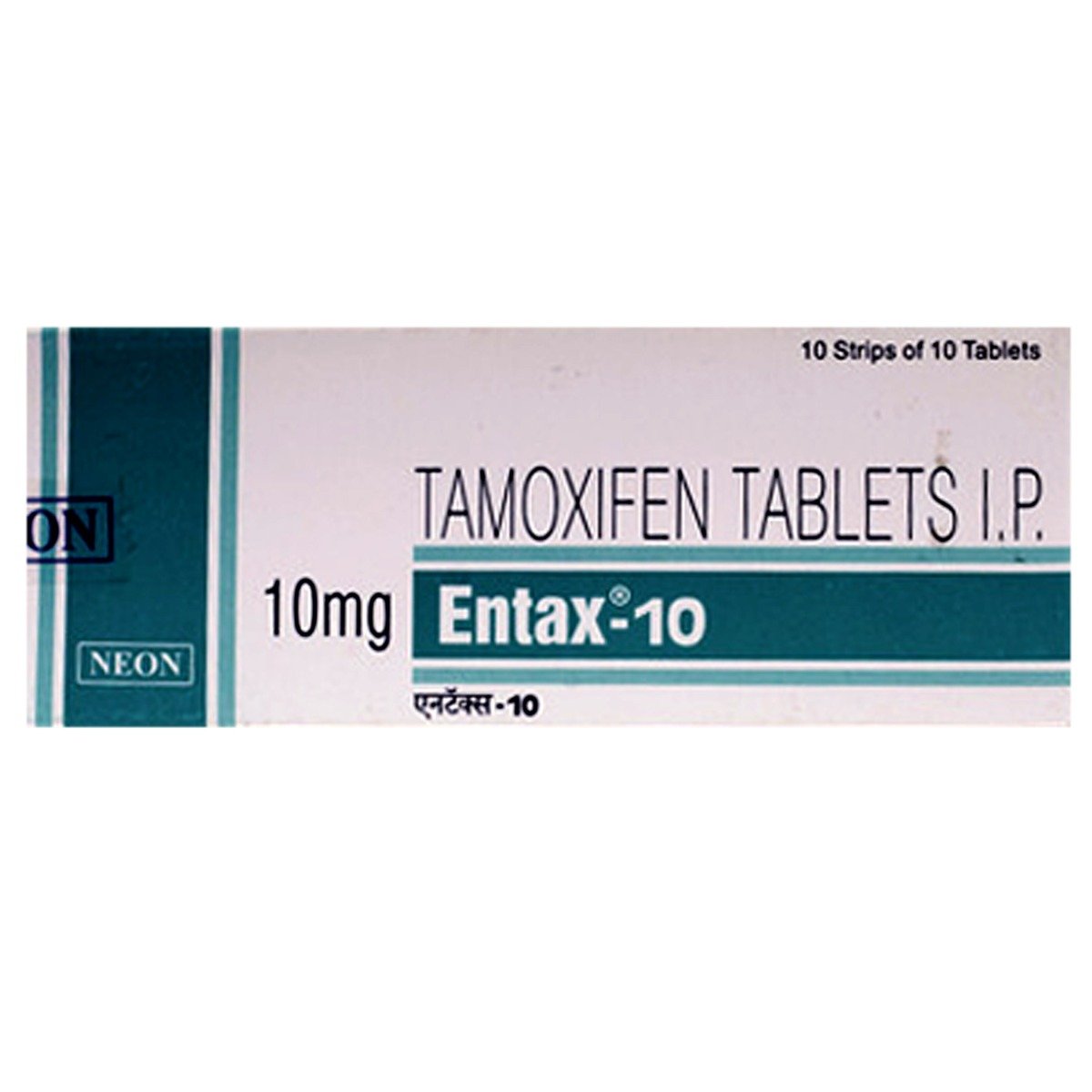Tamoxifen
About Tamoxifen
Tamoxifen belongs to the class of 'anti-neoplastic agents', primarily used to treat breast cancer. It is also used to treat infertility caused by failure in the ovulation (produce and release) process in women. Breast cancer is a type of cancer in the breast cells stimulated by a female sex hormone called oestrogen.
Tamoxifen contains Tamoxifen that belongs to the class of 'anti oestrogens. Some types of breast cancers need oestrogen (female sex hormone) to grow. Tamoxifen blocks the effects of this oestrogen, thus helps in treating breast cancer. Tamoxifen is also used to reduce the risk of occurrence of breast cancer in women due to age, personal and family medical history.
Use Tamoxifen as prescribed by your doctor. Your doctor will decide the dosage depending on your medical condition. The common side effects of Tamoxifen include hot flashes, headache, muscle aches, leg cramps, tiredness, nausea, thinning of hair and numbness or tingling sensation. These side effects are not familiar to everyone and vary individually. If you notice any side effects that are not manageable, please consult your doctor.
Do not take or stop this medicine if the doctor did not advise you to do so. Before starting Tamoxifen, let your doctor know if you have any medical history of liver or kidney diseases, heart diseases, high cholesterol levels, high blood pressure, diabetes, history of stroke or blood clot, receiving chemotherapy, and cataracts. Tamoxifen is not indicated for use in pregnant and breastfeeding women. Tamoxifen may make you feel tired, hence drive when you are alert only. It is not recommended to consume alcohol along with Tamoxifen. Tamoxifen is not recommended for children below two years of age.
Uses of Tamoxifen
Medicinal Benefits
Tamoxifen contains Tamoxifen, which is an anti-oestrogen drug. It treats breast cancer that has spread to other parts of the body in men and women. Tamoxifen is also used to treat breast cancer in women who are earlier treated with surgery, radiation, and chemotherapy. It effectively treats infertility caused by failure in the ovulation (produce and release) process in women. Some types of breast cancers need oestrogen (female sex hormone) to grow. Tamoxifen blocks the effects of this oestrogen, thus helps in treating breast cancer. Tamoxifen is also used to reduce the risk of occurrence of breast cancer in women due to age, personal and family medical history.
Directions for Use
Storage
Side Effects of Tamoxifen
- Hot flashes
- Headache
- Muscle aches
- Tiredness
- Leg cramps
- Nausea
- Thinning of hair
- Numbness or tingling sensation
Drug Warnings
Inform your doctor if you have any allergic reactions to Tamoxifen or other medications. Before starting Tamoxifen, let your doctor know if you have any medical history of liver or kidney diseases, heart diseases, high cholesterol levels, high blood pressure, diabetes, history of stroke or blood clot, receiving chemotherapy, and cataracts. Tamoxifen can affect the unborn baby when used in pregnancy. It may also have harmful effects on the breastfed infant when used by a lactating mother. Hence, Tamoxifen is not indicated for use in pregnancy and breastfeeding women. If you are using Tamoxifen, make sure to use reliable contraception forms to prevent pregnancy during the course. Tamoxifen can make you feel tired and affects your mental ability to drive. Do not drive or operate machinery if you are not mentally alert and focused. Avoid alcohol consumption while being treated with Tamoxifen. Tamoxifen is not recommended for children younger than two years of age.
Drug Interactions
Drug-Drug Interaction: Tamoxifen may interact with other drugs treating breast cancer (letrozole, anastrozole, exemestane), blood thinners (warfarin), anti-cancer drugs, antibiotics (rifampin), antidepressants (fluoxetine, paroxetine), fits medicines (carbamazepine, phenobarbital, phenytoin, primidone), anti-ulcer drugs (cimetidine), smoking cessation aids (bupropion), heart-related drugs (quinidine), and drugs treating hyperparathyroidism/overactive parathyroid gland (cinacalcet).
Drug-Food Interaction: Grapefruit and its juice may interact with Tamoxifen.
Drug-Disease Interaction: Tamoxifen should be used with caution in cases of liver or kidney diseases, heart diseases, high cholesterol levels, high blood pressure, diabetes, history of stroke or blood clot, receiving chemotherapy, and cataracts.
Drug-Drug Interactions Checker List:
Safety Advice

Alcohol
unsafeIt is unsafe to consume alcohol while using Tamoxifen. Please consult your doctor for more information.

Pregnancy
unsafeTamoxifen is a pregnancy category D drug. It is unsafe to use Tamoxifen in pregnancy and can have harmful effects on the unborn baby. Use reliable forms of contraception to prevent pregnancy while using Tamoxifen.

Breast Feeding
unsafeTamoxifen is not recommended to use during breastfeeding since it may be unsafe for the breastfed infant. Please seek medical advice if you are a nursing mother before starting Tamoxifen.

Driving
unsafeTamoxifen causes tiredness and may affect your ability to drive. Do not drive or operate machinery if you experience any unmanageable side effects with Tamoxifen.

Liver
cautionPlease let your doctor know if you have any history of liver diseases or hepatic impairment before starting Tamoxifen.

Kidney
cautionPlease let your doctor know if you have any history of kidney diseases before starting Tamoxifen.

Children
cautionTamoxifen is not recommended in children younger than two years of age.
Habit Forming
Diet & Lifestyle Advise
- Maintain a fibre-rich diet and include healthy carbohydrates from fruits, vegetables and whole grains.
- Include fish, soy, tomatoes, Brussels sprouts, kale, broccoli and oils containing omega-3 fatty acids such as olive oil as these foods may reduce the risk of prostate cancer.
- Avoid grilled meat, red meat, saturated fat found in animal products, milk and dairy products.
- Exercise regularly to lose weight as obesity is also considered a risk factor for prostate cancer.
- Eat at regular intervals.
- Keep your weight under control with BMI of 19.5-24.9.
- Opt for a diet rich in whole grains, fruits, veggies, and low-fat dairy products.
Special Advise
- Your doctor may advise regular physical exams and mammograms.
- Self-examine your breasts to check for any lumps monthly while using Tamoxifen.
- Your doctor may also advise liver function tests to monitor your liver health.
- Tamoxifen may interfere with specific tests like thyroid tests. Hence, it is important to inform your doctor or laboratory staff that you use Tamoxifen before undergoing any medical examinations.
Patients Concern
Disease/Condition Glossary
Breast cancer is a type of cancer that develops in breast cells stimulated by a female sex hormone called oestrogen. Breast cancer may form in lobules (glands that produce milk), ducts of the breast (the pathway that brings milk from glands to the nipple), in the fatty tissue or the fibrous connective tissue within the breast. The tumour cells invade other healthy breast cells and can travel to lymph nodes, a primary pathway for the cancer cells to move to other parts of the body. Symptoms of breast cancer include a lump in the breast or tissue thickening which feels different than the normal surrounding tissues, breast pain, redness, swelling, nipple discharge other than breast milk, bloody discharge, unexplained change in shape, size or appearance of the breast, peeling, flaking or scaling of the skin, and a lump or swelling under the arm.
FAQs
Tamoxifen contains Tamoxifen, an anti-neoplastic agent. It blocks the effects of the female sex hormone called oestrogen. This process of inhibition of the hormone's action can decrease cancer cells' growth in breast cancer.
Tamoxifen should be used with caution and under doctor's supervision only if you have any medical history of liver or kidney diseases, heart diseases, high cholesterol levels, high blood pressure, diabetes, history of stroke or blood clot, receiving chemotherapy, and cataracts. Let your doctor know if you have any other medical concerns before using Tamoxifen.
During treatment with Tamoxifen, it is essential to look for any signs of a stroke (slurred speech, sudden weakness or numbness, severe headache), signs of a blood clot in the lung (chest pain, sudden coughing, wheezing, rapid breathing, coughing up blood), and signs of a blood clot in one or both legs (pain, swelling, warmth, redness). If you further notice any symptoms that are not manageable or unusual, please seek prompt medical advice.
Take the missed dose as soon as possible. However, if it is time for the next dose, skip the missed dose and go back to your regular dosing schedule. Do not double the dose.







